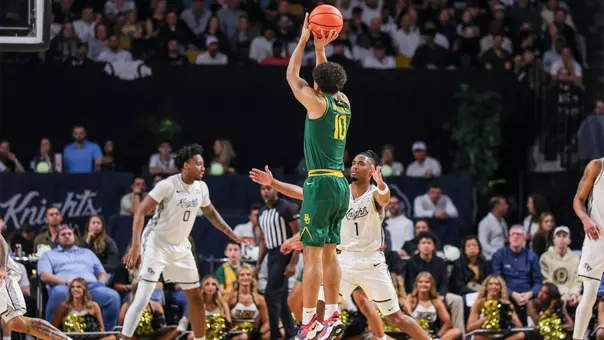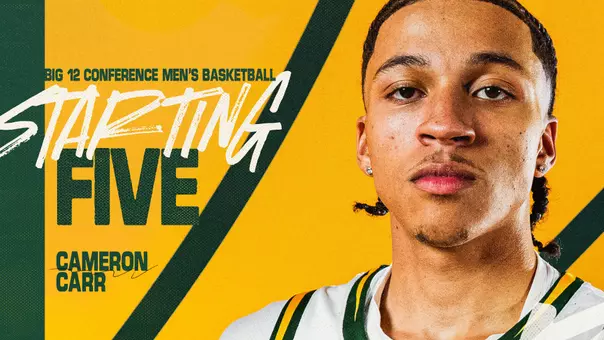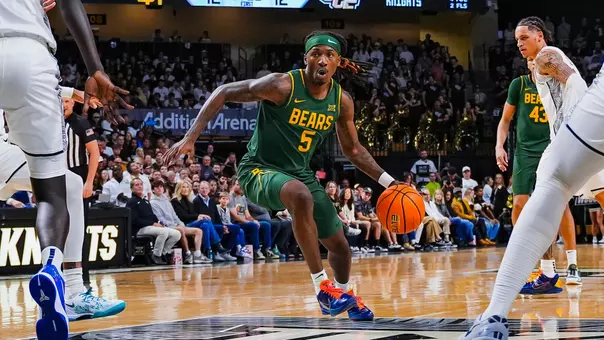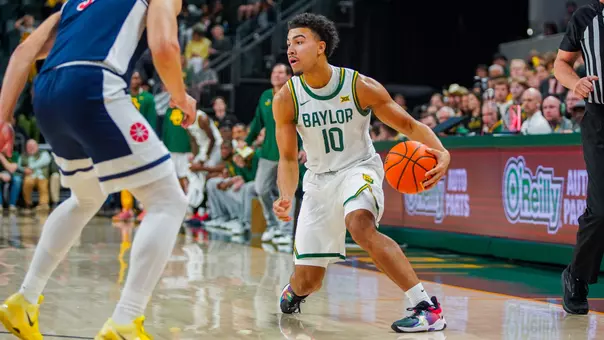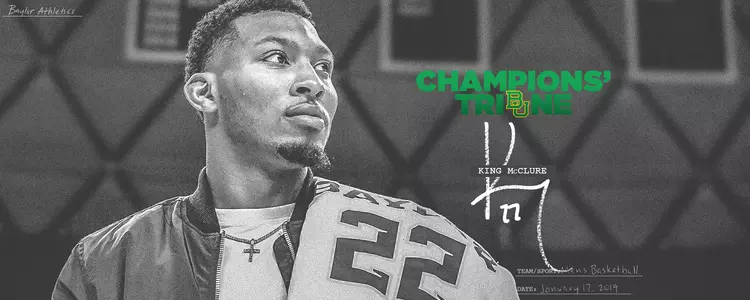
I’M THANKFUL FOR THE OPPORTUNITY TO DO WHAT I LOVE
1/17/2019 3:56:00 PM | Men's Basketball, My Baylor Story
Senior guard King McClure has overcome a heart condition to become one of the Bears’ best 3-point threats.
Champions' TriBUne Archive
By: King McClure
Champions' TriBUne is a special feature through Baylor Athletics that will give you the student-athlete's perspective and tell their story in their voice. King McClure is a senior shooting guard from Dallas, who was told by multiple doctors in Summer 2015 that he would never be able to play basketball again because of an existing heart condition called hypertrophic cardiomyopathy. He was cleared to play after having surgery to implant a cardiac defibrillator. Averaging a career-best 11.0 points per game with a team-leading 32 made 3-pointers, McClure is coming off a career-high 29-point game in Monday's 73-69 win over Oklahoma State:
 Out of all the colleges where I could have played, if I had gone to just about any of the other ones, I might be dead right now. It's a real blessing that Baylor tests for my heart condition, because many of the schools in America don't even test for it.
Out of all the colleges where I could have played, if I had gone to just about any of the other ones, I might be dead right now. It's a real blessing that Baylor tests for my heart condition, because many of the schools in America don't even test for it.
When we reported as freshmen in June 2015, we had no basketball activities the first week because we had to go through testing. I got the electrocardiogram (EKG), and my tests came back abnormal, so I couldn't start workouts with the rest of the team.
I had a follow-up MRI done in Temple, and the doctors still couldn't diagnose the issue. This is going on for two or three weeks, and I still can't do any basketball. They sent my test results all over the country, and we finally found somebody in Seattle.
I go up there with our athletic trainer David Chandler and my parents to talk with him, and the first thing he said was, "I've seen this kind of case twice – one was an NFL player and the other one was a professional basketball player – and I told both of them they had to stop playing. And I'm going to tell you the same thing. You can never play basketball again, or you will die." I didn't know what to say. My parents were like, "No! No! No! That can't be the case."
My high school coach had played with Monty Williams, who had the same heart condition I did, so he reached out and asked Monty what he did when he found out he had HCM. He referred us to the doctor he had seen who was now in Maryland. That doctor ran some tests and ended up giving us the exact same answer as the doctor in Seattle: "You can't play basketball ever again."
We didn't really know what to think, so we kept searching and searching. We finally found a place, the Mayo Clinic, which is probably the No. 1 clinic in America when it comes to cardiac diseases. We met with Dr. Michael Ackerman, and his first question was, "On a scale of 1 to 10, how badly do you want to play basketball?" I told him 15, because I still want to do this.
He said the good news is I can do it. The bad news is I have to have surgery and get an internal cardiac defibrillator implanted inside my body in order to play. I didn't really know what it was. My mom was struggling with the idea of me going through surgery and still being able to play, but it's kind of a risk that I felt I needed to take.
It took her probably two weeks to finally be OK with it. When she finally came to grips with the idea, she said, "If this is what you want to do, I will support you." My dad wanted to do it right now: "Let's hurry up and just get him back on the court." But mom, she loves me, I'm her baby boy. She was worried about the risk and just scared.
We flew out on July 28 and I had the surgery on the 29th to have the cardiac defibrillator placed inside my body. My life's been changed ever since. I think I'm the only person in college basketball, maybe in college sports, with a defibrillator inside their body.
Baylor was such a blessing, because most people when they hear HCM they're like, "I don't want to touch that. We don't want to take the risk." Just the fact that Baylor would put in the necessary precautions to allow me to still play here is a blessing, because I've heard so many stories.
There were definitely some moments in my head when I doubted whether I really wanted to do this anymore, just because when you hear the word death it makes you think about life a little differently. It's not that I fear death, but it makes you think differently. Do I want to collapse on the basketball court? Do I want my parents to bury me? So, there were definitely moments where I wanted to give it up, but my parents and their faith got me through it. They told me to never give up on my dreams.
My mom feels the reason I'm still able to play is because God wants me to impact people from all across the world who have been in the same shoes. Just being able to tell my story and use my platform, not just to honor God but to help people and give people hope that they might not have.

I'm really thankful for the opportunity to still be able to do what I love, just being able to still play when a lot of people would have given up on me. David Chandler traveled all across the country with me, and he's been so important throughout this process making sure all of the necessary precautions are in place. Coach Drew never gave up on me, fought for me, that meant a lot, not just him as a coach, but him as a man and just what he did for me. I'll forever have that respect and love for him in my heart, because he didn't have to do what he did, but he wanted to do it. That means the world to me and my family.
I have to admit, there were times my freshman year where I was so devastated. I had worked my whole life for this, I was highly recruited, and I didn't come here to sit the bench. That was the first time it happened to me, so I didn't know how to handle it.
More than anything, it was my parents and my faith that got me through my freshman year. Back then, I was too immature to really see that God has a plan for me. I would hear my parents say it and just listen to them because they're my parents. It was more their faith than mine. But now, as I've gotten older and deeper in my faith, I'm starting to see that I have to rely on my own faith and I have to really believe that God has a plan for me.
That's what I'm starting to see even now. I might not be scoring the way I'm used to, but I know God has a plan for me and everything is going to come together. Now, it's more my faith.
This year has been a little up and down. We've had some rough patches, losing to Texas Southern, losing to SFA. That happens when you're young, and when things like that happen, I kind of take the blame. I take it hard, I take it upon myself, like, "Dang, I'm the leader on this team and I'm failing right now."
But, I've accepted that it happens when you're young. We just have to bounce back and teach the guys how to respond when things like this happen, because we've hit adversity losing in the first round or not making the NCAA Tournament.
I also think this is God's way of helping me with my future endeavors as far as leading. I've seen a team make it to the Sweet 16 and I've seen a team go to the NIT. I wasn't the leader on those teams, but now it's my turn to lead. Do I want to be like the NIT team or do I want to be like the NCAA Tournament teams? That's on me. God has put me in this predicament to be able to lead a bunch of young guys, and I feel like it's just preparing me for my future.

Jake Lindsey and I came in together and were roommates since day 1. We've probably moved three or four times since then, but we've lived together the last four years. He's been one of my best friends, on and off the court, and will be one of my brothers for life.
When I found out that he wasn't going to be able play this year, I asked him how he would feel if I wore his number (3) in honor of him. He was really excited about it and thought it was cool. Just playing in honor of him is a big thing.
One of the things that Jake did for us is make the tough plays that a lot of guys won't make. I feel like, in a way, that's what I've done this year. I've made the Jake Lindsey plays that help us win games. I feel like I've definitely honored his number by making the tough plays and doing what he used to do for us.
I love basketball, but I'm starting to see that maybe God is calling me for something bigger. I want to get into sports broadcasting, be a sports analyst, but I also want to be a public speaker and I want to write books. I want to talk about my story, my journey and help give people hope. My ultimate goal is to have my own talk show on ESPN, but that's after I'm done playing basketball.
They used to call me quiet back in the day. But, they say once you leave the house, your personality comes out, and I feel like once I got to college, my real personality came out. I became a people person. I just liked being in front of the camera and doing interviews and having conversations with people.
A couple weeks ago, I had the chance of a lifetime when I got to shadow ESPN sideline reporter Holly Rowe during the women's game against UConn. I saw her at Big 12 Media Day and told her I wanted to be a sports analyst and do what she does, but I wasn't sure if she took me seriously. When she was here for the Lady Bears game, she asked me if I wanted to shadow her. That night really taught me a lot. I was able to hear everything, from what they said in the truck to what the producers were saying and the announcers. I got to see how they put together the production in the truck, and I got to be right there next to Holly Rowe, one of the best in the business. She's such an amazing person. For this famous, big-time person to take time out of her schedule and let me shadow her, that was so powerful.
I finished my degree in December in health, kinesiology and leisure studies with a minor in communications. School has been great. I've been able to get my degree in 3 ½ years, I've been able to meet a lot of people, build a lot of connections with people that will be able to help me for the rest of my life. It's been a great experience, and I'm so thankful to be part of the Baylor Family.

Previous Champions' TriBUne Features
Women's Basketball - Chloe Jackson (Jan. 3, 2019)
Football - Blake Blackmar (Dec. 13, 2018)
Volleyball - Braya Hunt (Nov. 29, 2018)
Soccer - Jackie Crowther (Nov. 16, 2018)
Cross Country - Alison Andrews-Paul (Nov. 8, 2018)
Football- Ira Lewis (Nov. 6, 2018)
By: King McClure
Champions' TriBUne is a special feature through Baylor Athletics that will give you the student-athlete's perspective and tell their story in their voice. King McClure is a senior shooting guard from Dallas, who was told by multiple doctors in Summer 2015 that he would never be able to play basketball again because of an existing heart condition called hypertrophic cardiomyopathy. He was cleared to play after having surgery to implant a cardiac defibrillator. Averaging a career-best 11.0 points per game with a team-leading 32 made 3-pointers, McClure is coming off a career-high 29-point game in Monday's 73-69 win over Oklahoma State:
 Out of all the colleges where I could have played, if I had gone to just about any of the other ones, I might be dead right now. It's a real blessing that Baylor tests for my heart condition, because many of the schools in America don't even test for it.
Out of all the colleges where I could have played, if I had gone to just about any of the other ones, I might be dead right now. It's a real blessing that Baylor tests for my heart condition, because many of the schools in America don't even test for it.When we reported as freshmen in June 2015, we had no basketball activities the first week because we had to go through testing. I got the electrocardiogram (EKG), and my tests came back abnormal, so I couldn't start workouts with the rest of the team.
I had a follow-up MRI done in Temple, and the doctors still couldn't diagnose the issue. This is going on for two or three weeks, and I still can't do any basketball. They sent my test results all over the country, and we finally found somebody in Seattle.
I go up there with our athletic trainer David Chandler and my parents to talk with him, and the first thing he said was, "I've seen this kind of case twice – one was an NFL player and the other one was a professional basketball player – and I told both of them they had to stop playing. And I'm going to tell you the same thing. You can never play basketball again, or you will die." I didn't know what to say. My parents were like, "No! No! No! That can't be the case."
My high school coach had played with Monty Williams, who had the same heart condition I did, so he reached out and asked Monty what he did when he found out he had HCM. He referred us to the doctor he had seen who was now in Maryland. That doctor ran some tests and ended up giving us the exact same answer as the doctor in Seattle: "You can't play basketball ever again."
We didn't really know what to think, so we kept searching and searching. We finally found a place, the Mayo Clinic, which is probably the No. 1 clinic in America when it comes to cardiac diseases. We met with Dr. Michael Ackerman, and his first question was, "On a scale of 1 to 10, how badly do you want to play basketball?" I told him 15, because I still want to do this.
He said the good news is I can do it. The bad news is I have to have surgery and get an internal cardiac defibrillator implanted inside my body in order to play. I didn't really know what it was. My mom was struggling with the idea of me going through surgery and still being able to play, but it's kind of a risk that I felt I needed to take.
It took her probably two weeks to finally be OK with it. When she finally came to grips with the idea, she said, "If this is what you want to do, I will support you." My dad wanted to do it right now: "Let's hurry up and just get him back on the court." But mom, she loves me, I'm her baby boy. She was worried about the risk and just scared.
We flew out on July 28 and I had the surgery on the 29th to have the cardiac defibrillator placed inside my body. My life's been changed ever since. I think I'm the only person in college basketball, maybe in college sports, with a defibrillator inside their body.
Baylor was such a blessing, because most people when they hear HCM they're like, "I don't want to touch that. We don't want to take the risk." Just the fact that Baylor would put in the necessary precautions to allow me to still play here is a blessing, because I've heard so many stories.
There were definitely some moments in my head when I doubted whether I really wanted to do this anymore, just because when you hear the word death it makes you think about life a little differently. It's not that I fear death, but it makes you think differently. Do I want to collapse on the basketball court? Do I want my parents to bury me? So, there were definitely moments where I wanted to give it up, but my parents and their faith got me through it. They told me to never give up on my dreams.
My mom feels the reason I'm still able to play is because God wants me to impact people from all across the world who have been in the same shoes. Just being able to tell my story and use my platform, not just to honor God but to help people and give people hope that they might not have.

I'm really thankful for the opportunity to still be able to do what I love, just being able to still play when a lot of people would have given up on me. David Chandler traveled all across the country with me, and he's been so important throughout this process making sure all of the necessary precautions are in place. Coach Drew never gave up on me, fought for me, that meant a lot, not just him as a coach, but him as a man and just what he did for me. I'll forever have that respect and love for him in my heart, because he didn't have to do what he did, but he wanted to do it. That means the world to me and my family.
I have to admit, there were times my freshman year where I was so devastated. I had worked my whole life for this, I was highly recruited, and I didn't come here to sit the bench. That was the first time it happened to me, so I didn't know how to handle it.
More than anything, it was my parents and my faith that got me through my freshman year. Back then, I was too immature to really see that God has a plan for me. I would hear my parents say it and just listen to them because they're my parents. It was more their faith than mine. But now, as I've gotten older and deeper in my faith, I'm starting to see that I have to rely on my own faith and I have to really believe that God has a plan for me.
That's what I'm starting to see even now. I might not be scoring the way I'm used to, but I know God has a plan for me and everything is going to come together. Now, it's more my faith.
This year has been a little up and down. We've had some rough patches, losing to Texas Southern, losing to SFA. That happens when you're young, and when things like that happen, I kind of take the blame. I take it hard, I take it upon myself, like, "Dang, I'm the leader on this team and I'm failing right now."
But, I've accepted that it happens when you're young. We just have to bounce back and teach the guys how to respond when things like this happen, because we've hit adversity losing in the first round or not making the NCAA Tournament.
I also think this is God's way of helping me with my future endeavors as far as leading. I've seen a team make it to the Sweet 16 and I've seen a team go to the NIT. I wasn't the leader on those teams, but now it's my turn to lead. Do I want to be like the NIT team or do I want to be like the NCAA Tournament teams? That's on me. God has put me in this predicament to be able to lead a bunch of young guys, and I feel like it's just preparing me for my future.

Jake Lindsey and I came in together and were roommates since day 1. We've probably moved three or four times since then, but we've lived together the last four years. He's been one of my best friends, on and off the court, and will be one of my brothers for life.
When I found out that he wasn't going to be able play this year, I asked him how he would feel if I wore his number (3) in honor of him. He was really excited about it and thought it was cool. Just playing in honor of him is a big thing.
One of the things that Jake did for us is make the tough plays that a lot of guys won't make. I feel like, in a way, that's what I've done this year. I've made the Jake Lindsey plays that help us win games. I feel like I've definitely honored his number by making the tough plays and doing what he used to do for us.
I love basketball, but I'm starting to see that maybe God is calling me for something bigger. I want to get into sports broadcasting, be a sports analyst, but I also want to be a public speaker and I want to write books. I want to talk about my story, my journey and help give people hope. My ultimate goal is to have my own talk show on ESPN, but that's after I'm done playing basketball.
They used to call me quiet back in the day. But, they say once you leave the house, your personality comes out, and I feel like once I got to college, my real personality came out. I became a people person. I just liked being in front of the camera and doing interviews and having conversations with people.
A couple weeks ago, I had the chance of a lifetime when I got to shadow ESPN sideline reporter Holly Rowe during the women's game against UConn. I saw her at Big 12 Media Day and told her I wanted to be a sports analyst and do what she does, but I wasn't sure if she took me seriously. When she was here for the Lady Bears game, she asked me if I wanted to shadow her. That night really taught me a lot. I was able to hear everything, from what they said in the truck to what the producers were saying and the announcers. I got to see how they put together the production in the truck, and I got to be right there next to Holly Rowe, one of the best in the business. She's such an amazing person. For this famous, big-time person to take time out of her schedule and let me shadow her, that was so powerful.
I finished my degree in December in health, kinesiology and leisure studies with a minor in communications. School has been great. I've been able to get my degree in 3 ½ years, I've been able to meet a lot of people, build a lot of connections with people that will be able to help me for the rest of my life. It's been a great experience, and I'm so thankful to be part of the Baylor Family.

Previous Champions' TriBUne Features
Women's Basketball - Chloe Jackson (Jan. 3, 2019)
Football - Blake Blackmar (Dec. 13, 2018)
Volleyball - Braya Hunt (Nov. 29, 2018)
Soccer - Jackie Crowther (Nov. 16, 2018)
Cross Country - Alison Andrews-Paul (Nov. 8, 2018)
Football- Ira Lewis (Nov. 6, 2018)
Players Mentioned
Baylor Baseball: Highlights at Tarleton State | March 3, 2026
Wednesday, March 04
Baylor Softball: Highlights vs. McNeese (Game 3) | March 1 2026
Tuesday, March 03
Baylor Softball: Highlights vs. McNeese (Game 1) | February 27, 2026
Tuesday, March 03
Baylor Basketball (M): Media Availability | March 3, 2026
Monday, March 02
